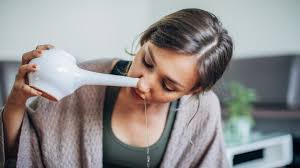Introduction: What Are Seasonal Allergies?
Seasonal allergies, also known as hay fever or allergic rhinitis, affect millions of people around the world. They usually strike during specific times of the year—especially spring and fall—when plants release pollen into the air. If you’ve ever experienced sneezing, a runny nose, itchy eyes, or even fatigue during these seasons, you’re not alone.
While many people turn to over-the-counter medications like antihistamines or decongestants for relief, there’s a growing interest in natural ways to treat seasonal allergies. Whether you prefer a more holistic approach or are trying to avoid side effects from medication, natural remedies can be a great option.
Let’s explore how to treat seasonal allergies naturally using safe and effective methods you can try at home.
1. Understand Your Triggers
The first step in treating seasonal allergies naturally is to identify what’s triggering your symptoms. Common seasonal allergens include:
- Pollen from trees (spring), grasses (summer), and weeds (fall)
- Mold spores, which thrive in moist environments
- Dust mites, which can become more active with changes in humidity
Use a pollen tracker app or website to monitor local pollen counts. Avoid going outside or opening windows on high-pollen days.
2. Rinse Allergens Away with a Saline Nasal Wash
A saline rinse or neti pot can help flush out pollen and irritants from your nasal passages. This reduces inflammation and helps you breathe easier.
How to do it:
- Use a sterile saline solution (available at pharmacies or made at home with boiled water and non-iodized salt).
- Tilt your head over a sink, insert the spout of the neti pot or bottle into one nostril, and let the solution flow out the other.
- Repeat on the other side.
Tip: Always use clean, distilled, or boiled water to prevent infections.
3. Try Local Raw Honey
Some studies and anecdotal evidence suggest that eating local raw honey regularly may help reduce your allergic response to local pollen.
Why it might work:
Raw honey may contain trace amounts of local pollen, and consuming it gradually might help your body build a tolerance.
How to use:
- Add 1–2 teaspoons of local raw honey to your tea, oatmeal, or smoothies daily.
- Use it consistently for several months, ideally starting before allergy season begins.
Note: This method isn’t a quick fix and may not work for everyone—but it’s a tasty and healthy addition to your routine!
4. Boost Your Immune System with Diet
Your immune system plays a big role in how your body reacts to allergens. Eating a balanced, anti-inflammatory diet can help reduce allergy symptoms.
Include more of:
- Fruits and vegetables: rich in vitamins C, E, and antioxidants
- Omega-3 fatty acids: found in fish, chia seeds, walnuts
- Fermented foods: like yogurt, kimchi, kefir, and sauerkraut (support gut health)
- Herbal teas: like green tea, nettle tea, or ginger tea can ease inflammation and congestion
Avoid:
- Processed foods
- Excess sugar
- Dairy (if you notice increased mucus production)
5. Use Herbal Remedies
There are several herbs known to naturally reduce allergy symptoms:
▸ Stinging Nettle:
A natural antihistamine. You can find it in capsules, teas, or tinctures.
▸ Butterbur:
Studies show it may be as effective as some over-the-counter allergy meds without the drowsiness.
▸ Quercetin:
A flavonoid found in apples, onions, and berries. It helps stabilize histamine-releasing cells.
Always consult a healthcare provider before starting new herbal supplements, especially if you’re on medication.
6. Essential Oils for Allergy Relief
Certain essential oils have natural antihistamine or anti-inflammatory properties. Popular options include:
- Peppermint oil: clears nasal passages
- Eucalyptus oil: opens airways
- Lavender oil: soothes irritation
How to use:
- Add a few drops to a diffuser
- Mix with a carrier oil and apply to your chest or temples
- Add to a steam bowl and inhale deeply
7. Keep Your Home Allergen-Free
Even if you’re using natural treatments, your home should be a safe space from allergens. Here’s how:
- Use HEPA filters in your air purifier and vacuum
- Wash bedding weekly in hot water
- Shower and change clothes after coming inside
- Keep windows closed during high pollen days
- Wipe down pets if they’ve been outdoors
8. Practice Breathing and Relaxation Techniques
Stress can weaken your immune system and worsen allergy symptoms. Try calming techniques like:
- Deep breathing
- Yoga
- Meditation
- Gentle exercise, like walking in the early morning when pollen levels are lower
These help regulate your nervous system and reduce inflammation.
9. Stay Hydrated
Water helps thin mucus and keeps your nasal passages moist, making it easier to flush out allergens.
Aim to drink at least 8 glasses (2 liters) of water daily. Herbal teas and broths can also help keep you hydrated and soothe irritation.
10. Try Acupuncture
Some people find significant allergy relief through acupuncture, a traditional Chinese therapy. Acupuncture may help regulate immune responses and reduce inflammation when done regularly by a trained professional.
Conclusion: Natural Relief Is Within Reach
Seasonal allergies can be frustrating, but you don’t have to rely solely on medications. From rinsing your sinuses and using herbal remedies to improving your diet and environment, there are many natural ways to manage seasonal allergies.
Remember that what works for one person may not work for another. It might take some trial and error to find the combination of remedies that’s best for you. Stay consistent, start early (before allergy season peaks), and keep your immune system strong.
Frequently Asked Questions (FAQs)
1. Can I completely cure seasonal allergies naturally?
There’s no permanent cure, but you can significantly reduce symptoms through natural methods like lifestyle changes, dietary improvements, and herbal remedies.
2. Is raw honey safe for everyone with allergies?
Raw honey is generally safe, but it’s not recommended for infants or people with severe pollen allergies or compromised immune systems.
3. How long do I need to try a natural remedy before seeing results?
Some remedies, like nasal rinses, work quickly, while others—like diet changes or honey—may take weeks or months. Consistency is key.
4. Are natural treatments enough, or should I still take medication?
Natural treatments can be effective, but if your symptoms are severe, you might need medication too. Talk to your doctor about a combination that works best for you.
5. Can I use essential oils every day for allergies?
Yes, but always dilute them properly and avoid overuse. If you have asthma or sensitive skin, consult a healthcare professional first.



